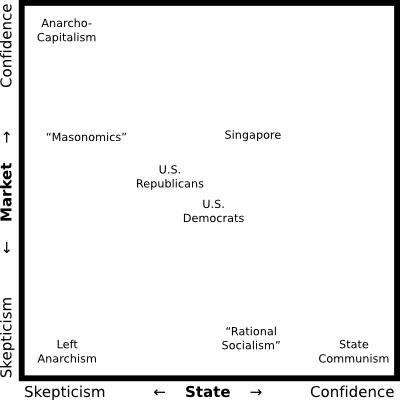Thought of while microblogging (emphasis added):
@glynmoody … I find it nice that movement gelling on both govt-skeptic and market-skeptic sides eg c4sif.org and p2pfoundation.net
As one moves toward increasing skepticism of both mechanisms, one might focus more on institutional design (wherein there is a huge space for exploration: two areas I’ve occasionally rambled about are commons and futarchy, both applicable to arrangements across state and market), as everything is broken and needs fixing. If one is much more skeptical about one mechanism than the other, one will assume the more confidence-inspiring mechanism will adequately check any problems of the other — e.g., so-called Masonomics:
At the University of Chicago, economists lean to the right of the economics profession. They are known for saying, in effect, “Markets work well. Use the market.”
At MIT and other bastions of mainstream economics, most economists are to the left of center but to the right of the academic community as a whole. These economists are known for saying, in effect, “Markets fail. Use government.”
Masonomics says, “Markets fail. Use markets.”
Presumably the prototypical Masonomist on the above spectrum would be far on the left (extremely skeptical of the state) and in the middle (somewhat skeptical of markets), leading such a person to always favor market solutions (the state being a lost cause), with more emphasis on the design of market institutions than someone merely confident in the market and skeptical of the state might. Schools of socialism that roughly mirror Masonomics must exist — “Governments fail. Use government [carefully].” — I just don’t know their names, so I put “rational socialism” on the spectrum.
It seems that from many places on the spectrum, one might beneficially increase skepticism of one’s preferred mechanism, so as to focus on making that mechanism work better, and thus “win” more in the long term. Admittedly, this might seem an awful tradeoff for an activist focused on bashing (whatever they see as) evil in the short term. Further, one genuinely interested in improving the world as opposed to making ideological points might focus on improving mechanisms that make criticism and improvement of all mechanisms easier (nothing remotely new about this observation) — these are public goods that facilitate the provision of more public goods.
Completely coincidentally (noted while writing this post), David Nolan died today. His name is associated with a fairly well known biaxial political spectrum. Nolan also founded the strategically unsound U.S. Libertarian Party. If it mattered at all, and weren’t in bad taste, I’d suggest it die with him!

Hi mister Mike,
Is there another version of the chart where U of Chicago and MIT are on it?
Thanks.
Don’t eat too much chocolate.
Hi Chris,
No, but feel free to make one. I suspect the quoted author is referring to UChicago and MIT econ departments of the past (1980s?) when they were strongly associated with particular views. I doubt that reflects current departments, so I didn’t attempt to place. The GMU description is contemporary I believe.
Thanks.
Ni!
Interesting read :)
I just don’t get this “left anarchist”. Do we really need a left-right label for honest, on the ground people who do not assume something is a solution before knowing the problem?
As the saying goes… “when you’ve got a hammer, all your problems look like nails.” That is all there can be behind people’s confidence in either market or state – or any other design.
Because there is no sense in carrying expectations about a specific solution, or even a mix of only two solutions, before stating the problem. And the problems facing society are as diverse and complex as they get.
This simple yet revealing idea that political ideologies are bullshit because different problems more often than not require different solutions – that it is meaningless to condone or condemn a design before knowing what it will interact with – seems missing from the chart and text, although it lies at the bottom of the issue.
Political ideologies were a useful device to rush political and economical agendas of the past to the masses, and they’ve been used for both private and public interest at times. But today we should know better than resorting to such a lowly tool.
ale
Alexandre,
I have plenty of sympathy with the idea that political ideologies are bullshit. However, not all ideologies are as simplistic as demanding a single solution to all problems, many people are deeply committed to political ideologies, few of those people would admit to their ideology being so simplistic, ie bullshit, so unless one is incredibly predisposed to the idea that political ideologies are bullshit, upon hearing your “revealing idea” they will assume this really means other ideologies are bullshit.
A point of the political skeptrum above (beyond the curiosity of yet another extremely crude painting of the world) is to implant the idea that people ought be slightly more skeptical of their ideological commitments, and might do so without fear of betraying those commitments.
In other words, very small steps. To anyone willing to skip small steps, call bullshit on political ideologies, and practice some kind of a thoroughgoing and adaptive consequentialism in their place, please do!
[…] staffing and increased resident cooperation with police (and vice versa). Admittedly this kind of fix-what-you-advocate-to-increase-its-long-term-success is a satisfying position for me, but perhaps not for many […]